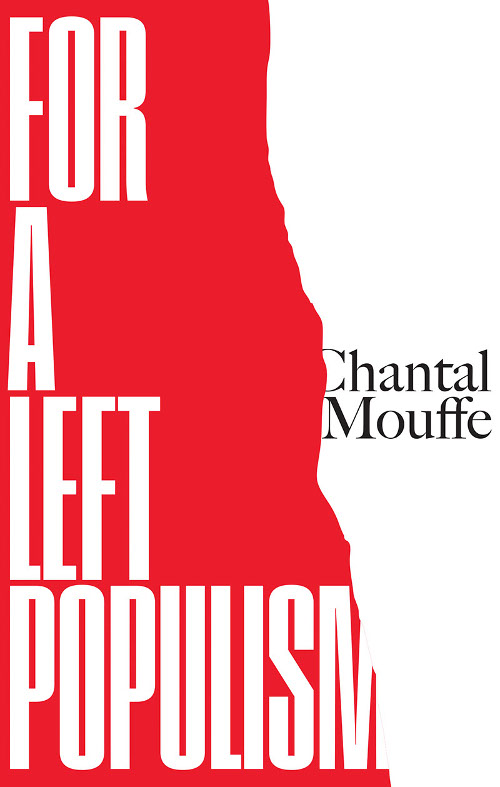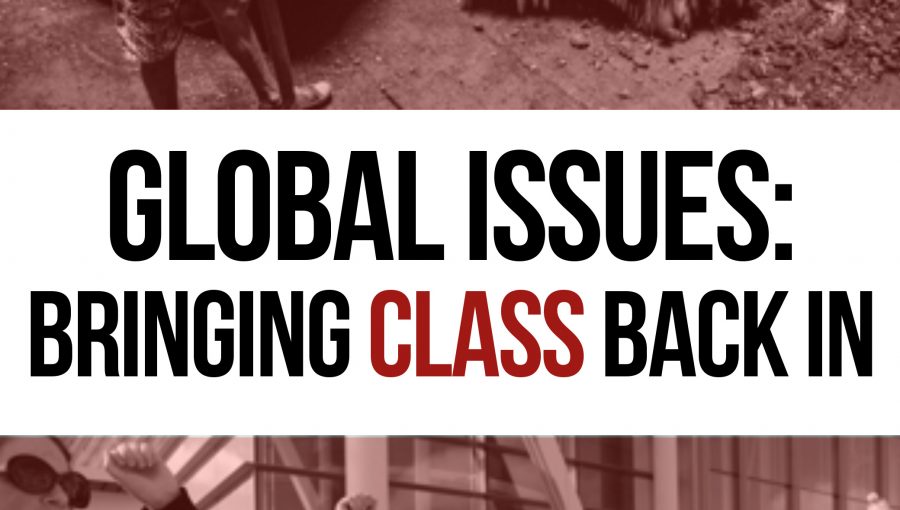For a Liberal Populism?
Over thirty years have passed since Chantal Mouffe and her late partner Ernesto Laclau developed the political philosophy of ‘Post-Marxism’ in their seminal text Hegemony and Socialist Strategy (1985). It was here where Mouffe and Laclau first challenged what they perceived as the vulgar and economistic forms class analysis found within Marxian political theory. The Post-Marxist field of social theory they introduced was an anti-orthodox Marxian philosophy that would be more inclusive to contemporary struggles which they argue cannot be discussed using only the language of class.
 In her most recent text For a Left Populism (2018) Mouffe reflects on the current ‘populist moment’ in the West; providing a tool-kit for progressive social forces. Mouffe’s brand of populism has served as an inspiration for emergent left political parties such as Podemos in Spain. However, the case of Podemos exhibits a clear tension between populist left factions oriented toward mass appeal and broad coalition building; and the more radical factions oriented toward a Manichean struggle against the political establishment and bourgeois elites of all stripes and party affiliations.
In her most recent text For a Left Populism (2018) Mouffe reflects on the current ‘populist moment’ in the West; providing a tool-kit for progressive social forces. Mouffe’s brand of populism has served as an inspiration for emergent left political parties such as Podemos in Spain. However, the case of Podemos exhibits a clear tension between populist left factions oriented toward mass appeal and broad coalition building; and the more radical factions oriented toward a Manichean struggle against the political establishment and bourgeois elites of all stripes and party affiliations.
Chain of Equivalence
In the wake of both a crumbling elite neoliberal centre and the rising tide of reactionary right-wing populism in Western Europe, For a Left Populism proposes a radical democratic alternative to the far-right, establishment liberalism, and the ‘extreme-left’ through the creation of a new left populist hegemonic project. For Mouffe, “A left populist strategy aims at federating the democratic demands into a collective will to construct a ‘we’, a ‘people’ confronting a common adversary: the oligarchy. This requires the establishment of a chain of equivalence among the demands of the workers, the immigrants and the precarious middle class, as well as other democratic demands, such as those of the LGBT community” (50).
Mouffe envisions a left populism which combines: movements directed toward social justice for racialized/ethnic/religious minorities, traditional labour movements, ecological justice organizations, women’s liberation organizations, LGBTQ+ rights organizations, refugee/immigration support networks, anti-war movements, as well as other subaltern civil society groups – all of which have been marginalized by what can be broadly described as the politics of neoliberalism. For Mouffe, this democratic collective of plural subjectivities will combine in their separate but equal struggles against the elite beneficiaries of neoliberalism.
A left populism for Mouffe would then not only target the capitalist mode of production and socioeconomic forms of class struggle, but instead would address the multiple forms of oppression found within a regime of neoliberal capitalism; including those forms of oppression which she claims cannot be articulated and defended within the strictures of a vulgar Marxist class analysis. Mouffe faults the extreme left for describing its political adversaries with abstract concepts like ‘capitalism’ and rather argues the populist left should speak to the lived experiences of marginalized and oppressed groups (97). This wide array of progressive struggles will then form a progressive political mosaic which can replace the dystopian neoliberal hegemonic formation.
Agonistic Democracy and Antagonistic Populism
Mouffe’s left populist project would also not accept the notion that democracy is simply achieving popular consensus (an assumption she describes as ‘post-political’) but rather as the ability for all marginalized groups to participate and articulate their desires within an agonistic democracy. Developed initially in her text On the Political (2005), agonistic democracy describes an ideal pluralist left politics where the adversarial interplay between various partisan groups is fundamental to political participation, but is differentiated from the more antagonistic types of struggle which she invokes toward political enemies – namely, the oligarchic elite.
While a progressive agonistic democracy is the end objective of Mouffe’s political strategy, she argues that in the more immediate term the left must adopt an antagonistic friend/enemy framework as a crucial step in overcoming the ‘post-politics’ of establishment neoliberal centrism, and more importantly to build a broad coalition to prevent far-right social forces from achieving hegemony during the current political crisis she describes as the ‘populist moment’. Following Laclau, Mouffe views populism as a particular way of mobilizing society into politics often during a period of interregnum, i.e. hegemonic crisis and institutional failure. For Mouffe, populism itself is then absent of any innate ideological content, and therefore is not bound to be simply a ‘morbid symptom’ of a crumbling political order (26). The interregnum of the neoliberal era is then understood as a period of contestation, one where the left has a window of opportunity to forge an emancipatory populism to resist the morbidity of the far-right.
Mouffe seeks to build a left populist frontier between ‘the people’ and ‘the oligarchy’ and challenge to the neoliberal regime which has been hegemonic since the 1980s. The antagonistic populist frontier of ‘we’ vs. ‘they’ would then for Mouffe provide an alternative to the cleavage political model which subordinates all democratic contestation to ‘differences of opinion’ and has been a hallmark of the post-politics of the neoliberal era. Mouffe’s left political project however stops short of proposing a fundamental break from liberal democracy (71). Moreover, she finds it regrettable that Marxists have presented liberal democracy as part of the superstructure of global capitalism and argues that a progressive politics can emerge through a liberal-democratic framework (94).
Populism, Class, and the ‘Moral Excellence of the Oppressed’
Perhaps the best critical response to Mouffe’s Post-Marxism, left populism, and progressive attempts to salvage the Liberal democratic model comes from the recently deceased Domenico Losurdo. Best known in the Anglosphere for his radical historical text Liberalism: A Counter History (2011), the Italian Marxist philosopher spent a decades-long career highlighting the hypocrisy and ideological inconsistency of bourgeois political theory. In what would be one of his final texts Class Struggle: A Political and Philosophical History (2016), Losurdo elaborates on the concept of class in Marx and Engels and how it continues elucidate the dynamics of left social struggles. While a staunch defence of class analysis was the theoretical spearhead of his critique, the prevailing political concern of Losurdo in Class Struggle is the burgeoning popularity of populism on the left. In response, Losurdo argues for a more complex and multidimension theory of class struggle, one which is absent of a heroic political narrative of ‘us vs. them’. He warns of the political consequences of left populism when he states: “In absolutizing the contradiction between masses and power, and condemning power as such, populism proves incapable of drawing a line of demarcation between revolution and counter-revolution” (337).
 For Losurdo, Marxists and Post-Marxists have often described class struggle in binary and often Manichean terms i.e., proletariat vs. bourgeoisie or oppressed vs. oppressor (327). This narrow reading of class in Marx’s work is largely the result of The Communist Manifesto and its positive-sum and teleological conception of class struggle between the bourgeoisie and proletariat. Losurdo challenges whether this conceptualization of class struggle is representative of Marx and Engel’s writings on the subject. More than just a struggle between oppressor and oppressed, Losurdo points to intra-elite class struggles as a form of class struggle absent of a moral political force. He notes how the framework of class struggle in Marx identifies bourgeois class with distinguishable elite factions that have historically engaged in struggles, competition and contestation (19).
For Losurdo, Marxists and Post-Marxists have often described class struggle in binary and often Manichean terms i.e., proletariat vs. bourgeoisie or oppressed vs. oppressor (327). This narrow reading of class in Marx’s work is largely the result of The Communist Manifesto and its positive-sum and teleological conception of class struggle between the bourgeoisie and proletariat. Losurdo challenges whether this conceptualization of class struggle is representative of Marx and Engel’s writings on the subject. More than just a struggle between oppressor and oppressed, Losurdo points to intra-elite class struggles as a form of class struggle absent of a moral political force. He notes how the framework of class struggle in Marx identifies bourgeois class with distinguishable elite factions that have historically engaged in struggles, competition and contestation (19).
Contrary to ‘chain of equivalence’ envisioned by Mouffe, Losurdo argues that left populism has essentialized/fetishized non-class identities, has masked the contradictory unity of oppressed groups, and has provided an overly simplistic theory of political struggle. He warns that theoretical framework which is absent of class as an ontological starting point risks slippage into a paradigm which ignores historical material context and naturalizes identities, instead of properly situating them within a Marxist framework of class (28). Losurdo further points to how Marx and Engels’ understanding of class oppression did not essentialize the identities of its victims, but rather remained focused the capitalist system which assigned them this class position. He notes:
“There is no room for essentialism. As in the case of oppressed peoples, so with women it makes no sense to explain their condition by reference to some alleged nature that has long been despised, but whose moral superiority must now, in an inversion of the traditional value judgement, be recognized and celebrated. Instead, it is a question of analysing and challenging a historically determinate division of labour, which entails colonial or semi-colonial subjugation and domestic slavery or segregation.” (338)
Critical of Post-Marxism, Losurdo argues that contemporary struggles such as those against racial and/or gender discrimination must be understood through the lens of class analysis. He would warn the class fractions which Mouffe’s left populism seeks unite around a common framework, each have their own internal class dynamics and interests which do not necessarily align around a common rubric to transform social relations and create an alternative to capitalism. The condemnation of power crucial to left populism then may eventually create conditions where revolution and counter revolution will be indistinguishable. He notes: “In the struggle to free themselves from the self-hatred and the denigration they have traditionally been subjected to, the protagonists of social, national, and sexual liberation movements often adopt stereotypes from conservative and reactionary culture, while reversing their value judgements and turning them against their oppressors.” (324).
Podemos and the Evolving ‘We’: the Limits of Left Populist Strategy
Losurdo’s Class Struggle then challenges left populism on three fronts: 1) he argues, contrary to Mouffe, that the struggles of marginalized and oppressed groups, peoples, and nations can be discussed along class lines, and that class must remain as the genus from which to theorize the struggles relegated by Post-Marxists as distinct from traditional forms of class struggle; 2) that any coalition of the oppressed along populist lines will expose their disparate and heterogenous demands; 3) there is no certainty ‘the people’ will form a positive-sum struggle against the ‘elites’ and instill a fundamental transformation in the mode of production (317).
Reading Losurdo one might ask: Is there anything transformative or radical in Mouffe’s brand of left populism – or is a more robust and progressive liberal pluralist hegemony the panacea envisioned by the Post-Marxist project? The political content of left populism varies quite sharply between supporters, and there is ample evidence that particular segments of the so-called populist left are much more open to cooperation with centrist establishment political party elites if it means defeating a conservative neoliberal right.
The trajectory of Spain’s Podemos is instructive in this regard. Arriving on the political scene in 2014, Podemos was designed to be the political party to represent the indignados movement (otherwise known as the 15-M Movement), which, in 2011, held mass protests in response to the generalized crisis afflicting Spain in the aftermath of the 2008 financial crash. In recent years, significant intraparty tensions have plagued the leadership of Podemos, specifically in regard to its political strategy and its relationship with the centre-left Spanish Socialist Workers Party (PSOE). Current Podemos leader Pablo Iglesias, initially wedded to the radical roots of his party, sought for his party to remain defiant and antagonistically juxtaposed to the establishment elite, including the PSOE, and aligned with the United Left and other minor left parties prior to the 2016 election with the majority support of his party. In contrast, Iñigo Errejón, the moderate number two of Podemos and member of Spain’s Congress of Deputies (lower house of parliament), sought to increase the parliamentary power of the party through a more cooperative and consolatory approach toward the PSOE as a means to defeat the conservative People’s Party (PP) dominance in the legislature. Podemos underperformed in the 2016 general election, calling into question the defiant strategy of its leader Iglesias.
Following a corruption scandal and non-confidence motion in June 2018 the PP government of Mariano Rajoy was ousted and was replaced by PSOE leader Pedro Sánchez as the new prime minister. Iglesias has since displayed a willingness to cooperate with the new PSOE government, signing on to a progressive budget deal for 2019 and has shown interest in forming a coalition with PSOE before the 2020 election. Key questions regarding such alliance remain: 1) Will Podemos push the PSOE toward a radical anti-neoliberal populist politics? 2) Will Podemos become coopted and pacified by an institutionalized political party establishment it once opposed? 3) Along what lines will class struggles be fought within a potential coalition?
Conclusion
Questions such as these can be addressed only through a complex analysis of class dynamics and not wishful thinking. Mouffe implies that big tent style politics is a path toward the transformation of neoliberal capitalism. While Mouffe’s style of left populism might provide useful strategy to build broad coalitions for a more progressive politics within the nation-state, Losurdo provides a sober reminder not to ignore class struggles and contradictions that will persist within such a movement despite noble attempts to build a ‘chain of equivalence’.
Whether a sweeping left populism can swell in its ranks and achieve political power without diluting its once radical anti-neoliberal message is yet to be seen. The apparent plateauing of support for such left populist projects like Podemos in Spain and Jean-Luc Mélanchon’s La France Insoumise leaves little room for optimism. What is clear is that the lines which divide ‘we’ vs. ‘they’ in a left populist political project tend to become blurred and open to interpretation during the pursuit of hegemony. •
References
- Losurdo, Domenico. Class Struggle, Palgrave Macmillan, 2016.
- Mouffe, Chantal. For a Left Populism, Verso Books, 2018.





